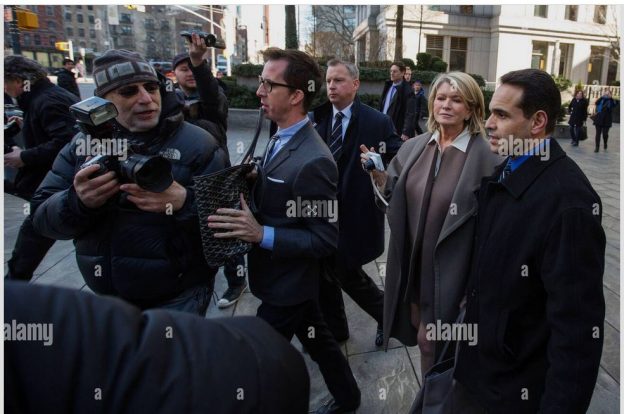Judging from the power-to-the-proletariat statements members of the jury issued after the trial of Martha Stewart and Peter Bacanovic, this jury was guided more by the spirit of Madame Defarge than Lady Justice. Missing only were the blood-thirsty character’s knitting needles, although the jurors might as well have been knitting – they certainly did not grasp that Martha had not committed the non-crime of insider trading.
Chappell Hartridge, the juror who heralded this miscarriage of justice as a victory for the “little guy,” followed up with yet another statement that ought to constitute grounds for an appeal: “We all knew in our hearts that the sale was based on Sam’s actions.” The perception that Ms. Stewart had been charged with insider trading – that she sold the fateful 3,928 ImClone shares after being tipped by insider and former ImClone CEO, Sam Waksal – clearly tainted the jury’s verdict.
Ms. Stewart, however, had not been accused of insider trading. The government had not charged her with acting on information received from ImClone’s Sam Waksal about the FDA’s (demented) decision to refuse a Biologics Licensing Application for Waksal’s promising cancer drug, Erbitux. It was not for lack of trying, mind you, but rather for a lack of evidence – while the government’s case rested on an insider-trading investigation, the probe failed to prove that Ms. Stewart received material nonpublic information, or that Peter Bacanovic, her Merrill Lynch stockbroker, gave her such information. Furthermore, Ms. Stewart was not an “insider” in this instance – she sold the shares of a company to whose shareholders she had no fiduciary duty.
When it became apparent to the government that they had no “crime” for which to nab her, they used the unrehearsed interviews she had given law-enforcement officers in good faith to charge Ms. Stewart with conspiracy, obstruction of justice and lying to investigators about a matter that was not a crime in the first place.
Think about the ubiquitous scene in the movies where the suspect bolts and the cop gives chase. Cop hauls suspect in for questioning, only to find out that he has the wrong man in custody. “If you are innocent, why did you run?” the detective typically blurts. To which the suspect replies, “I was afraid.” In the Stewart and Bacanovic pursuit, the unfortunate suspects, however, are not released, but prosecuted for the act of … running.
This entrapment was easily facilitated under the unconstitutional Title 18, Sec. 1001 of the U.S. Code, according to which it is a crime to make “a materially false” statement to a federal official even when not under oath. (It is perfectly fine for said official to bate and bully a private citizen into fibbing.)
Section 1001 neatly accommodates a plethora of due-process violations: Having laid the trap, the FBI and the Department of Justice failed to have on hand even as much as a court reporter. Tape recordings or accurate transcripts of the interviews they conducted with Ms. Stewart were unavailable at trial. Ill-served by her lawyers who allowed these impromptu interviews, Ms. Stewart did not think to insist on being apprised of her rights, not least of which was to remain silent. There was insufficient proof as to whether any mistakes she made during these spontaneous interviews were made innocently or “knowingly and willfully,” as the prosecution alleged. Yet the U.S. attorney’s apparatchiks flagrantly imputed criminal intent to Ms. Stewart.
Having failed to make the charge of insider trading stick, the Department of “Justice,” unabashed, then tried to sling at Ms. Stewart the most novel of securities fraud charges. Early in the sad saga, congressional investigators began leaking to the media that she had traded on insider information from Sam Waksal. She dared to counter in self-defense by issuing a denial in the press.
The government then said that by proclaiming her innocence – giving her version of the events – Ms. Stewart committed securities fraud, because she did this with the intention of buoying the stock price of Martha Stewart Living Omnimedia. In effect, Ms. Stewart’s exercise of her First Amendment rights served as a muse for the indictment in Count Nine. One has to be of an incorrigibly corrupt mindset to concoct such a count. While the presiding judge, Miriam Goldman Cedarbaum, was more amused than aggravated by the legal overreach, she did dismiss the count.
The fate of these two hapless victims is tied to the statutes under which they were prosecuted – statutes that concern acts that are criminal only because the state has criminalized them (mala prohibita) as opposed to acts which are universally evil (mala in se).
Notwithstanding the truly totalitarian nature of putting someone in jail for engaging in capitalistic exchanges, when the government alleges a crime has been committed, the onus is on the prosecution to prove beyond a reasonable doubt the presence of certain elements, chief of which are 1) that a crime actually occurred 2) that there was criminal intent (mens rea).
This burden was not met – our law and its zealous officers allowed a criminal prosecution to proceed without proof that a crime was committed or that a guilty mind was involved.
We should all be afraid – very afraid.
©By ILANA MERCER
WorldNetDaily.com
March 12, 2004
CATEGORIES: Constitution, Criminal injustice, Economy, Law, Regulation, Socialism

 print
print